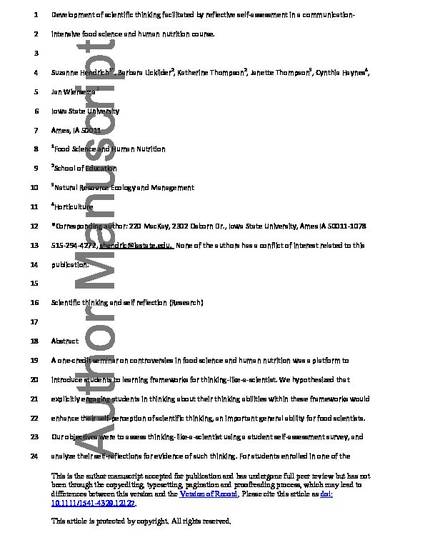
A one-credit seminar on controversies in food science and human nutrition was a platform to introduce students to learning frameworks for thinking-like-a-scientist. We hypothesized that explicitly engaging students in thinking about their thinking abilities within these frameworks would enhance their self-perception of scientific thinking, an important general ability for food scientists. Our objectives were to assess thinking-like-a-scientist using a student self-assessment survey, and analyze their self-reflections for evidence of such thinking. For students enrolled in one of the offerings of this course among five semesters from 2012-2014, differences in scores on a survey instrument for thinking-like-a-scientist from the beginning to the end of the course showed gains in self-assessed abilities (N = 21-22 students/semester). In each of the first 2 semesters in which we introduced thinking-like-a-scientist frameworks, students thought they were better at defining problems scientifically by 13-14%. In the third course offering, students’ self-assessment of their abilities to seek evidence improved by 10%. In the fourth and fifth semester course offerings, students’ self-assessed abilities to develop plans based on evidence improved by 7-14%. At the end of each semester, students’ self-reflections on scientific thinking (N = 20-24/semester) included specific reference to asking questions (45-65% of reflections) and making plans based on evidence (26-50% of reflections). These data support the usefulness of self-reflection tools as well as specific learning frameworks to help students to think about and practice thinking-like-a-scientist.
Available at: http://works.bepress.com/janette_thompson/41/

This is the peer reviewed version of the following article: Hendrich, Suzanne, Barbara Licklider, Katherine Thompson, Janette Thompson, Cynthia Haynes, and Jan Wiersema. "Development of Scientific Thinking Facilitated by Reflective Self‐Assessment in a Communication‐Intensive Food Science and Human Nutrition Course." Journal of Food Science Education 17, no. 1 (2018): 8-13, which has been published in final form at doi:10.1111/1541-4329.12127. This article may be used for non-commercial purposes in accordance with Wiley Terms and Conditions for Use of Self-Archived Versions.